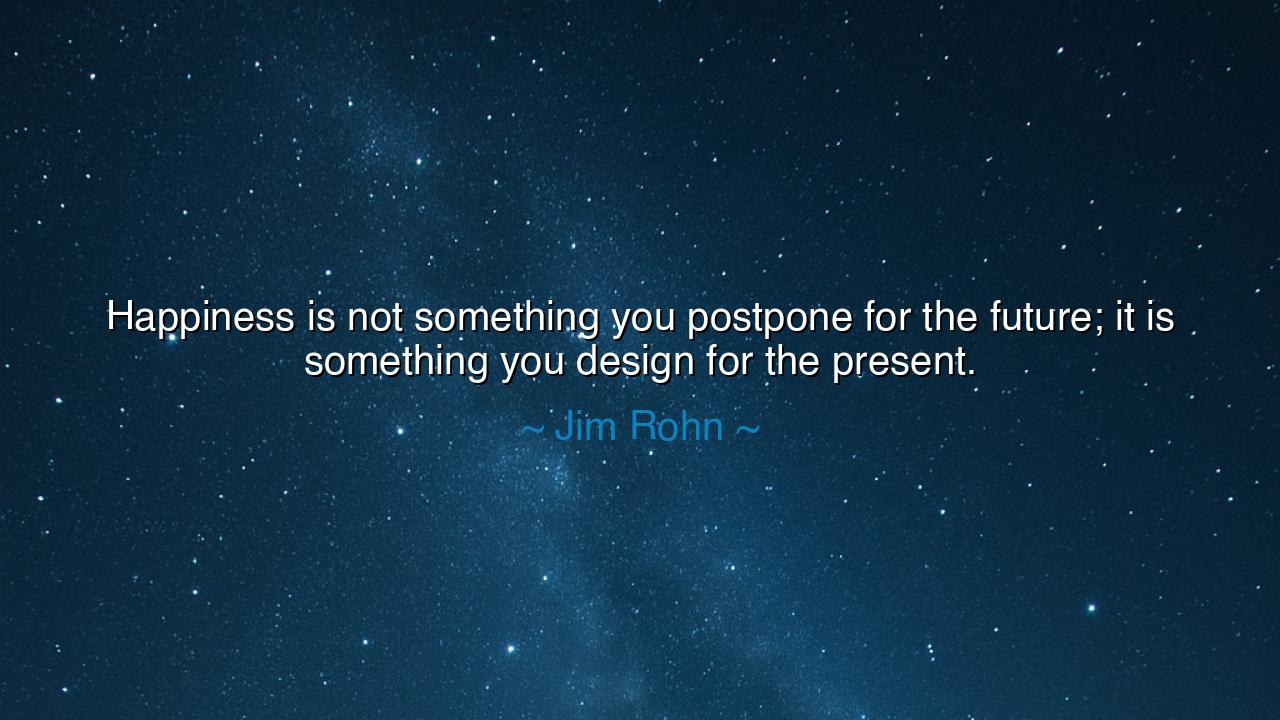
Happiness is not something you postpone for the future; it is
Happiness is not something you postpone for the future; it is something you design for the present.






In the depths of human experience, there exists a profound and universal truth: happiness is not a distant promise, a reward to be earned in some far-off future. Jim Rohn, in his timeless wisdom, declares, “Happiness is not something you postpone for the future; it is something you design for the present.” These words cut through the illusion that happiness is a mere destination—a distant land to be reached only after a lifetime of struggle and sacrifice. Instead, Rohn teaches us that happiness is a state to be cultivated right here, right now. It is not a future prize to be claimed, but a present moment to be embraced and intentionally created.
The ancient philosophers spoke frequently of the present moment, understanding that true fulfillment and peace can only be found in the here and now. Socrates himself, in his quest for the good life, often stressed the importance of living in accordance with one’s virtues in the present, not waiting for some future event or material gain to bestow meaning upon existence. Aristotle, too, in his Nicomachean Ethics, argued that happiness (or eudaimonia) is not an end to be reached, but a way of living in harmony with one’s deepest values, finding joy in every step of the journey. These ancient truths align with Rohn’s insight: happiness is a design, a conscious creation made in the present, not a reward for the future.
The great thinkers of old understood that the future is uncertain, and placing one’s hope for happiness solely in what lies ahead is a dangerous gamble. Consider the life of Marcus Aurelius, the Roman emperor and Stoic philosopher, who wrote extensively in his journals about the importance of living in accordance with nature and focusing on what is within one’s control in the present moment. Despite his immense power and wealth, Aurelius acknowledged that happiness does not come from external circumstances but from an inner peace that arises when one aligns themselves with virtue and wisdom. His life was a testament to the fact that true happiness is a choice to be made every day, rooted not in the acquisition of more, but in the cultivation of a mind at peace with the present moment.
Jim Rohn’s words also bring to mind the parable of the mustard seed from ancient religious teachings. In this story, a small seed, planted with care, grows into a mighty tree. So too is happiness—small actions, small choices made in the present moment, contribute to the growth of something great. A single act of kindness, a moment of gratitude, or the decision to focus on the positives in life, no matter how small, all serve to plant the seeds of contentment and joy in the soil of our daily existence. Happiness is not a result of grand, sweeping events, but of intentional living in the present, where each small action feeds the growing tree of well-being.
Consider the example of Mahatma Gandhi, a man who, despite the overwhelming challenges he faced in leading the Indian independence movement, maintained an inner peace and happiness rooted in his daily practice of ahimsa (non-violence) and truth. Gandhi did not wait for the future to grant him peace; he designed his life through his actions, his words, and his commitment to living in alignment with his values. Even in the most difficult circumstances, he found joy in the present moment, in the work he was doing to serve the greater good. His life is a profound example of how happiness is not something to be postponed, but something to be created through daily practice, rooted in one’s commitment to their own moral compass and the greater good of humanity.
The lesson here is clear: happiness is not a distant reward or a future goal. It is something that can be designed and cultivated in the present moment. Rohn’s words challenge us to take responsibility for our own happiness, recognizing that it is not dependent on external circumstances or future achievements. Just as the ancients taught, happiness is found not in what we possess or what we accomplish, but in how we live each day. It is a state of mind, a choice to live in alignment with our values, to embrace the small joys, and to find peace in the process, not the outcome.
In our own lives, we must learn to design our happiness through action, not by waiting for the perfect moment to arrive, but by making each moment we are given meaningful. Begin by focusing on what is within your control—the choices you make, the thoughts you cultivate, the way you treat others, and how you engage with the world around you. Take moments each day to practice gratitude, to find joy in the simple things, and to align your actions with your values. Remember, happiness is not a distant destination, but a living, breathing experience created in every small decision you make.






AAdministratorAdministrator
Welcome, honored guests. Please leave a comment, we will respond soon